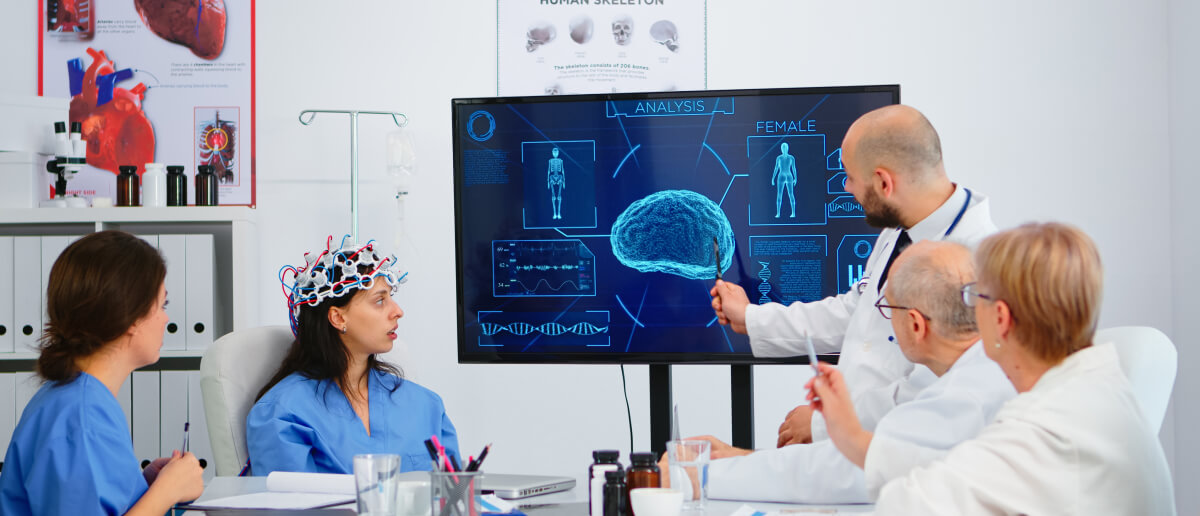By : Kumar Shubham
21 Key Examples of Artificial Intelligence in Healthcare

13
Dec
Artificial Intelligence, or AI, is a game-changer in healthcare, offering innovative solutions and improvements. In this article, we will explore 21 standout examples of artificial intelligence in healthcare, showcasing how these advancements are reshaping patient care and medical practices. Let’s dive in and discover how AI is transforming healthcare in ways we never imagined!
Examples of Artificial Intelligence in Healthcare
-
Disease Diagnosis and Prediction: AI algorithms can analyze medical images like X-rays, MRIs, and CT scans to detect diseases such as cancer, pneumonia, or brain anomalies. They can also predict the likelihood of future medical conditions based on patient data.
-
Personalized Medicine: AI helps in developing personalized treatment plans for patients. By analyzing a patient’s genetic makeup, lifestyle, and other factors, AI can suggest the most effective treatment options and medications.
-
Drug Discovery and Development: AI speeds up the process of drug discovery by predicting how different drugs will react in the body. This helps in identifying potential treatments more quickly and efficiently.
-
Robotic Surgery: Surgical robots, powered by AI, can assist surgeons in performing precise and minimally invasive surgeries. These robots can reduce human error and improve patient outcomes.
-
Virtual Health Assistants: AI-powered chatbots and virtual assistants can provide health information, remind patients to take their medications, and even assist in symptom assessment, reducing the need for frequent doctor visits.
-
Healthcare Administration: AI is used to streamline administrative tasks in healthcare settings. This includes managing patient records, scheduling appointments, and optimizing healthcare workflows.
-
Epidemiology and Public Health: AI is instrumental in tracking disease outbreaks and predicting public health trends. It can analyze large datasets to identify patterns and help in making informed public health decisions.
-
Mental Health Monitoring and Support: AI applications can monitor patients’ mental health by analyzing speech patterns, facial expressions, and writing styles. They can provide early warnings of mental health issues and offer therapeutic support.
-
Remote Patient Monitoring: Wearable devices and sensors powered by AI can monitor patient health in real-time, providing data on vital signs and alerting healthcare providers to any abnormalities.
-
Clinical Trial Research: AI helps in identifying suitable candidates for clinical trials more efficiently, analyzing vast amounts of data to find patients who meet the specific criteria for a given study.
-
Genomic Sequencing Interpretation: AI algorithms can rapidly interpret genomic sequencing data, identifying genetic mutations and variations that may be linked to specific diseases. This is crucial for understanding complex genetic disorders and tailoring personalized treatments.
-
Early Detection of Sepsis: AI models can analyze patient data in real-time to identify early signs of sepsis, a potentially life-threatening condition. This allows for quicker intervention, significantly improving patient outcomes.
-
AI-Powered Prosthetics: Advanced prosthetics use AI to mimic the natural movements of limbs. These prosthetics can learn and adapt to the user’s movement patterns, providing a more natural and intuitive experience.
-
Sleep Analysis and Improvement: AI is used in sleep technology to analyze patterns and improve the quality of sleep. It can identify sleep disorders and suggest changes in environment or habits to enhance sleep quality.
-
Automated Behavioral Analysis for Autism: AI systems can analyze videos of children to detect behavioral patterns associated with autism spectrum disorders. This can lead to earlier diagnosis and intervention.
-
Emotional Health Analysis: Using AI to analyze speech patterns, facial expressions, and other behavioral cues, healthcare providers can gain insights into a patient’s emotional and mental well-being, aiding in the diagnosis and treatment of conditions like depression or anxiety.
-
Predicting Patient No-shows: AI can predict which patients are likely to miss appointments, helping healthcare facilities manage schedules more effectively and reach out to patients to reduce no-show rates.
-
Enhancing Radiology with AI: Beyond just diagnosing diseases, AI can provide radiologists with additional information, such as highlighting areas of interest in complex images or predicting the likelihood of disease progression.
-
Neural Network-Based Hearing Aids: AI-driven hearing aids can differentiate between various types of sounds and enhance speech recognition, significantly improving the user’s experience in different auditory environments.
-
AI in Dentistry: AI is used to analyze dental images, helping in the early detection of conditions like cavities, gum disease, and oral cancers. It can also assist in treatment planning and predicting outcomes of dental procedures.
- Nutrition and Lifestyle Management: AI can personalize nutrition plans based on a person’s health data, lifestyle, and preferences, assisting in managing conditions like diabetes, obesity, or cardiovascular diseases.
Conclusion
These examples illustrate just a fraction of AI’s potential in revolutionizing healthcare. As AI continues to evolve, we can expect even more innovative solutions that will further improve healthcare delivery and patient outcomes, making healthcare more accessible, efficient, and effective for everyone.


